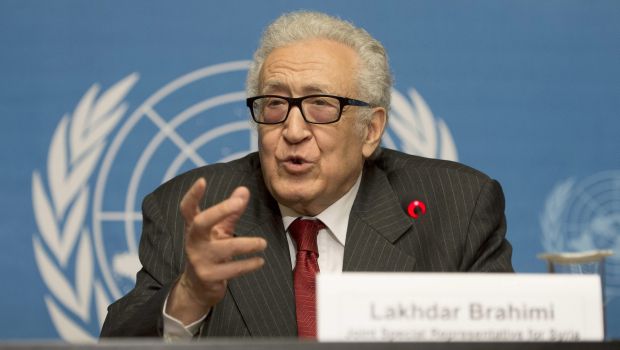
UN Joint Special Representative for Syria, Lakhdar Brahimi delivers a press conference at the European headquarters of the United Nations, in Geneva, Switzerland, 05 November 2013 (EPA/JEAN-CHRISTOPHE BOTT)
At this first session of the Geneva Conference on Syria, the Syrian Government and the Syrian opposition met for the first time to discuss ending the war and finding a political solution to save their country.
At Montreux, more than 40 countries, along with the United Nations and three regional organizations, came together to insist that the unspeakable suffering of the population of Syria must cease. They urged the two sides to come to a political settlement meeting the aspirations of the people of Syria and fully implementing the Geneva Communiqué of 30 June 2012.
Over the past eight days here in Geneva, the sides engaged each other through me. It was a difficult start. But the sides have become used to sitting in the same room. They have presented positions, and listened to each other. There have been moments where one side has acknowledged the concerns and point of view of the other. Progress is very slow indeed, but the sides have engaged in an acceptable manner. This is a modest beginning on which we can build.
The sides came here to discuss a political solution. But whenever Syrians meet, they cannot but discuss the terrible situation on the ground, and they did. I personally appealed for action to address the desperate humanitarian situation in Syria. Homs was extensively discussed, though unfortunately there has been no breakthrough yet. We also discussed access to other places, as well as the idea of a country-wide pause in the fighting to allow access to all areas.
Some good news came yesterday with the delivery of humanitarian assistance to the Yarmouk camp for Palestinian refugees. But so much more is needed. Humanitarian discussions will continue on the ground; important countries are engaged; and there will be further push on humanitarian issues at a conference organized by Emergency Relief Coordinator Valerie Amos in Rome early next week.
In terms of the political settlement, I noted on the very first day that the sides were committed to discussing the full implementation of the Geneva Communiqué of 30 June 2012. Both sides have offered their overall vision on the future of Syria, and how this vision can be achieved through full implementation of the Geneva Communiqué. This week we started to discuss the specific areas of the cessation of violence in all its forms, including the fight against terrorism; and the transitional governing body exercising full executive powers.
The gaps between the sides remain wide; there is no use pretending otherwise. Nevertheless, during our discussions, I observed a little bit of common ground—perhaps more than the two sides realize or recognize. I made a mental note of these points. I shared these points with the two sides today, and I thought perhaps I should share them with you:
• Both sides are committed to discussing the full implementation of the Geneva Communiqué to achieve a political solution in Syria. And they repeated that today.
• Both sides know that, to implement the Geneva Communiqué, they must reach agreement on a permanent and comprehensive end to the conflict and on the establishment of a Transitional Governing Body with full executive powers, as well as on subsequent steps. Chief amongst them; national dialogue, constitutional review, and elections.
• Both sides understand that the conflict in their country has imposed immense and unacceptable suffering on the Syrian people. Both sides recognize the urgent need to bring the violence to an end. We hope they will also redouble their efforts to seek early opportunities to reduce the level of violence on the ground.
• Both sides believe that the future of Syria can only be determined by the people of Syria, men and women, through peaceful means, without any external intervention and interference, direct or indirect.
• Both sides are committed to ensuring that the sovereignty, independence, territorial integrity and unity of Syria needs to be fully respected, and that no loss of territory will ever be accepted.
• Both sides foresee a future for the country that reflects the best of the historical and cultural traditions of Syria’s diverse people and its history of harmony and tolerance.
• Both sides understand that the Syrian people are longing for a genuinely democratic Syria where governance is transparent and accountable and based on human rights and the rule of law.
• Both sides understand that the humanitarian situation of the population must be addressed rapidly, on the basis of need alone, wherever such need exists in the country. We hope they will act on this, and on the issue of detainees, the kidnapped, and the disappeared.
• Both sides recognize that the safety and security of all in Syria must be preserved and assured, along with the continued functioning and reform of State institutions and public services.
• Each side stated in no uncertain terms that they reject violent extremism and terrorism.
As I say, this is MY assessment of where I see the parties basically saying the same thing, or almost the same thing. And I hope that we can start to build more common ground when next we meet.
We will now have a short break in the negotiations, to allow the sides to prepare their more detailed positions on the issues raised already, and on all other aspects of the Geneva Communiqué of 30 June 2012.
I suggested we resume, on the basis of an agreed agenda, on 10 February 2014. The delegation of the opposition agreed to this date. That of the government said they needed to consult with Damascus first.
For all the Syrians trapped in this war, our work here will seem far too slow. I understand that. But we are trying to overcome the very difficult issues that have led to this war, and this unfortunately takes time.
